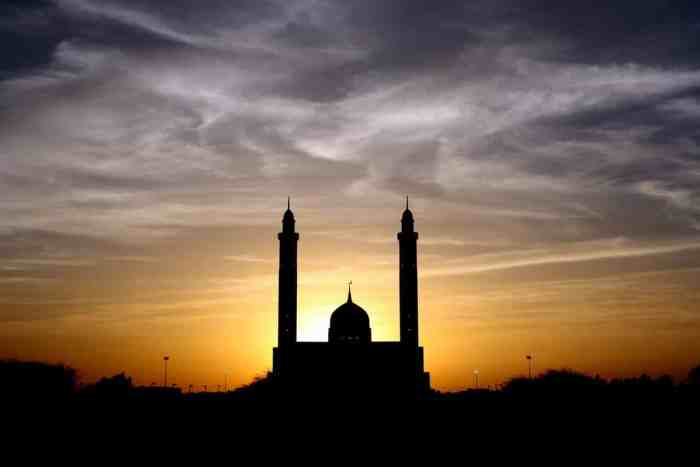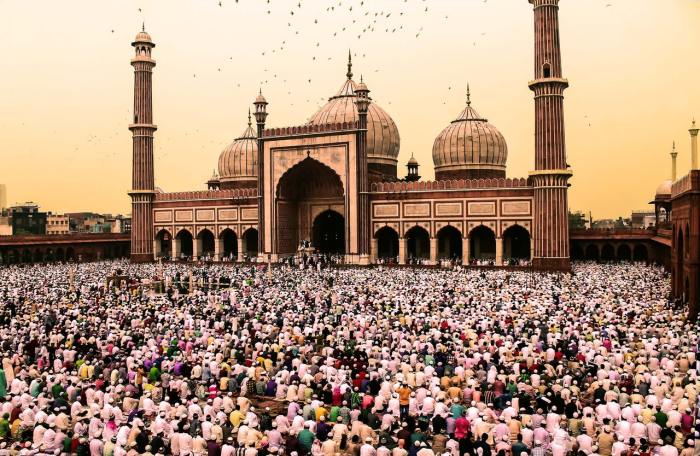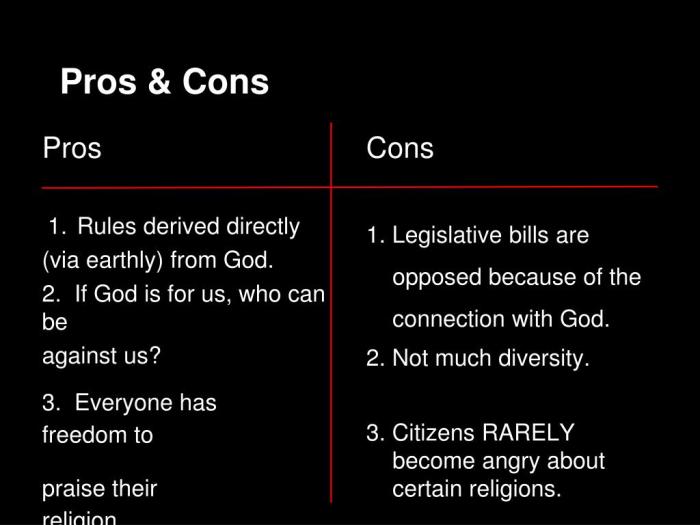Pros and cons of a theocracy – Embark on an exploration of theocracy, a governance system that intertwines religion and politics, delving into its potential advantages and drawbacks. As we delve into the nuances of this unique form of government, we’ll unravel its historical roots, examine its impact on societies, and assess its relevance in the modern world.
The concept of theocracy has captivated human civilization for centuries, shaping societies and influencing the course of history. From ancient Mesopotamia to contemporary Iran, theocracies have left an indelible mark on the global landscape. Join us as we delve into the complexities of this intriguing topic, uncovering the multifaceted nature of theocracy.
Definition and Concept of Theocracy

A theocracy is a system of government in which the laws and policies are derived from religious teachings and beliefs. The term “theocracy” originates from the Greek words “theos” (god) and “kratos” (rule), literally meaning “rule by God.”
Theocratic governments have existed throughout history, with notable examples including the ancient Hebrew kingdoms, the Islamic caliphates, and the medieval European papal states. In modern times, several countries, such as Iran and Vatican City, have governments that are based on religious principles.
Key Characteristics of Theocracy
Theocratic governments typically share certain key characteristics:
- Religious Law:The laws of the land are based on religious teachings and scriptures.
- Clerical Rule:Religious leaders or representatives have significant political power and influence.
- State Control of Religion:The government exerts control over religious practices and institutions.
- Limited Individual Freedoms:Personal freedoms and rights may be restricted in accordance with religious beliefs.
- Moral Enforcement:The government actively promotes and enforces religious values and morals.
Advantages and Benefits of Theocracy

Theocratic governance, with its divine mandate, offers several potential advantages and benefits. One key aspect is the maintenance of social order and stability. By aligning laws and societal norms with religious principles, theocracy can provide a strong moral compass for individuals, reducing crime and fostering a sense of community.
A theocracy, with its divine rule, offers both advantages and drawbacks. One aspect worth considering is the prefix of scope or meter ( prefix of scope or meter ). In a theocracy, such prefixes may shape the interpretation of religious texts, influencing the scope and limitations of laws and policies.
This can impact various aspects of society, including personal freedoms and the balance of power.
Moral Guidance and Spiritual Fulfillment
Theocracies prioritize moral guidance and spiritual fulfillment for their citizens. Religious teachings serve as the foundation for ethical conduct, providing individuals with a clear sense of right and wrong. By promoting religious practices and rituals, theocracies aim to enhance spiritual well-being and foster a connection with the divine.
Protection of Religious Values and Traditions
Theocracies play a crucial role in preserving and protecting religious values and traditions. By institutionalizing religious beliefs into law and governance, they ensure that religious practices and customs are respected and upheld. This can be particularly important in societies where religious identity is closely intertwined with cultural heritage and national identity.Historically,
theocracies have demonstrated the ability to effectively address these benefits. For instance, the ancient Israelite theocracy under the leadership of Moses and the prophets established a comprehensive legal and moral framework based on divine principles. This framework promoted social harmony, provided moral guidance, and preserved the religious traditions of the Israelites.
Disadvantages and Challenges of Theocracy

Theocratic rule, while adhering to religious principles, presents several disadvantages and challenges that can undermine its purported benefits. These include:
Suppression of Religious Minorities
Theocracies often prioritize the religious beliefs of the majority, leading to the suppression and persecution of religious minorities. This can manifest in various forms, including:
- Restrictions on the practice of minority religions
- Discrimination against individuals belonging to minority faiths
- Forced conversion or assimilation into the dominant religion
Historical examples of such suppression include the persecution of Christians in the Roman Empire and the oppression of Shi’a Muslims in Saudi Arabia.
Comparison of Theocracy to Other Forms of Government
Theocracy stands distinct from other forms of government due to its unique blend of religious and political authority. Here, we compare and contrast theocracy with democracy, monarchy, and oligarchy:
Democracy, Pros and cons of a theocracy
Democracy, where power resides with the people, contrasts sharply with theocracy. In a democracy, citizens hold the power to elect representatives who govern on their behalf. Theocracy, on the other hand, vests authority in religious leaders or institutions, who wield both political and spiritual influence.
Advantages of Democracy:
- Responsive to the will of the people
- Promotes individual rights and freedoms
- Encourages political participation
Disadvantages of Democracy:
- Can be slow and inefficient
- Subject to populism and mob rule
- May not adequately represent minority interests
Monarchy
Monarchy, where power is concentrated in the hands of a single ruler, shares some similarities with theocracy. Both forms of government rely on a centralized authority figure. However, in a monarchy, the ruler’s power is typically hereditary, while in a theocracy, it is based on religious authority.
Advantages of Monarchy:
- Provides stability and continuity
- Can foster a sense of national unity
- May promote efficiency in decision-making
Disadvantages of Monarchy:
- Concentrates power in the hands of a few
- Can lead to tyranny or despotism
- May stifle political participation
Oligarchy
Oligarchy, where power is held by a small group of individuals, differs from theocracy in that its authority is not derived from religious beliefs. Instead, power is concentrated among a select few based on wealth, social status, or political connections.
Advantages of Oligarchy:
- Can provide stability and order
- May be more efficient than other forms of government
- Can foster economic growth
Disadvantages of Oligarchy:
- Concentrates power in the hands of a few
- Can lead to corruption and inequality
- May stifle political participation
Contemporary Issues and Debates

Theocratic governance continues to spark controversy and debate in modern society. Its impact on religious freedom, human rights, and political stability is a topic of ongoing discussion.
The role of theocracy in modern society is multifaceted. Some argue that it provides a moral framework for governance, while others contend that it can lead to religious oppression and the suppression of dissenting voices.
Theocracy and Religious Freedom
One of the most pressing concerns surrounding theocracy is its potential impact on religious freedom. In theocratic states, the dominant religion often enjoys a privileged position, while minority faiths may face restrictions or persecution.
- For example, in Saudi Arabia, the practice of any religion other than Islam is prohibited, and individuals who convert to other faiths may face severe consequences.
- In contrast, in countries like the United States, where the separation of church and state is enshrined in the constitution, religious freedom is generally well-protected.
User Queries: Pros And Cons Of A Theocracy
What is the primary advantage of theocracy?
Theocracies often emphasize social order and stability, as religious principles provide a clear framework for societal norms and behaviors.
How does theocracy impact religious minorities?
In some cases, theocracies may suppress religious minorities, as the dominant religion holds sway over the political and legal systems.
Can theocracy promote moral guidance?
Yes, theocracies often seek to instill moral values based on religious teachings, providing a sense of purpose and direction for citizens.